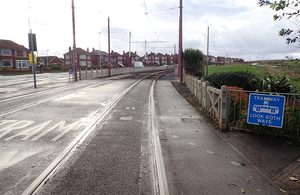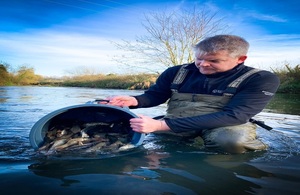Boost for high streets and businesses as markets and outdoor marquees allowed permanently
- Local hospitality businesses no longer need planning permission to put up marquees on their land and councils will no longer need planning permission to hold an outdoor market
- Measures originally introduced during the pandemic will now be made permanent following public consultation
- This will draw more people to high streets and town centres and boost local businesses
High streets and local business are set to benefit from changes to planning rules, which mean markets can be held more often and marquees put up in pub and restaurant gardens without the need for planning permission, the Department for Levelling Up, Housing and Communities announced today (20 December 2021).
The changes to permitted development rights, first introduced last year as a temporary measure to boost high streets and small businesses during national restrictions, are being made permanent following a public consultation.
Pubs, cafes and restaurants will now be able to install gazebos on their own land without planning permission, helping them to better make use of their outside space all year round. Councils will also be able to hold street markets as required without the need for a planning application, attracting more people to high streets and town centres and boosting local businesses.
Housing Minister Rt Hon Christopher Pincher MP said:
The changes we introduced last year supported our town centres and high streets during national restrictions, making sure businesses could stay open and helping to instil a sense of community in our local areas.
Making these measures permanent will help business and communities to build back better from the pandemic and are just one part of our vision to transform towns and cities across England into thriving places to work, visit and live.
Craig Beaumont, Chief of External Affairs at the Federation of Small Businesses, said:
Today’s announcement is a positive, sensible deregulatory measure. It permanently removes barriers for small businesses to do things that we all love in our local areas, and so small firms will be pleased to see this.
As we look to keep going through the Omicron wave, this will be something that supports the Spring economic recovery, giving a boost to firms on the high street, in retail, in pubs and restaurants, in markets, in small-scale events and in the weddings industry that have all been affected so deeply by COVID.
Kate Nicholls CEO of UKHospitality said:
Marquees and other structures provided a lifeline for some businesses during the pandemic, evidencing the value of covered outdoor spaces to hospitality venues.
Today’s announcement is a really positive move to rid businesses of an administrative burden and encouraging better use of outdoor space – for many venues it will expedite future recovery and growth.
Historic visitor attractions and hospitality businesses operating in listed buildings will be able to install a gazebo for 120 days in a 12-month period. This will provide additional flexibility while minimising the impacts to heritage sites.
The permitted development right allowing councils and health services to adapt their facilities more easily is being extended for a further year (until 31 December 2022). The right will continue to support the response to the pandemic, including enabling pop-up vaccination centres to support the government’s booster drive.
Today’s announcement is just one of the ways the government is supporting local businesses and high streets to build back from the pandemic, including introducing protections for commercial tenants and the extension of the streamlined process for pavement licensing, enabling businesses to continue to provide al fresco dining.
The permitted development rights (PDR) introduced in 2020 to 2021 that are now being made permanent following a public consultation. These measures will apply to England.
1. The Right for markets to be held by or on behalf of local councils
Originally introduced in June 2020, this PDR allowed markets to be held by or on behalf of local councils for an unlimited amount of days, including the provision of moveable structures related to this use.
This measure, which supported the use of outdoor public spaces and the reopening of the high street, will now be made permanent.
The right excludes markets on sites designated as Scheduled Monuments and Sites of Special Scientific Interest.
2. Rights for moveable structures in the grounds of pubs, cafes, restaurants and historic visitor attractions
Pubs, cafes and restaurants will be able to erect a moveable structure for an unlimited number of days without the need for a planning application .
Listed pubs, restaurants, cafes and historic visitor attractions will be able to erect a moveable structure for 120 days in a 12-month period, subject to prior approval by the local council.
This will ensure we protect historic assets whilst also making best use of their outdoor spaces to operate in.
These rights exclude markets on sites designated as Scheduled Monuments.
Additional measures apply to all moveable structures to minimise impacts on surrounding communities, including limits to size, height and distance to residential boundaries.
These measures, introduced through PDRs, are separate to changes to pavement licenses introduced last year. Pavement licenses allow hospitality businesses to place furniture, such as tables and chairs, on the pavement outside their premises the PDR for movable structures allows businesses to install marquees in gardens or outside areas on their own land.

